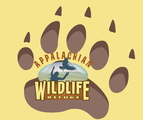
-Appalachian Wild Tracks-
A blog following in the footsteps of nonprofit Appalachian Wild as we rescue, rehabilitate, and release orphaned and injured wildlife.
Sign up to have Appalachian Wild Tracks in your inbox monthly.
-Appalachian Wild Tracks-
A blog following in the footsteps of nonprofit Appalachian Wild as we rescue, rehabilitate, and release orphaned and injured wildlife.
Sign up to have Appalachian Wild Tracks in your inbox monthly.
Animal Success Stories!
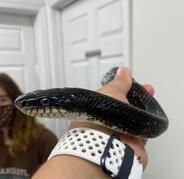
Appalachian Wildlife Refuge is pleased to announce several exciting reptile releases have occurred in the past month, with quite a few cold-blooded patients recovered and now happily soaking up the sun out in the wild. As one of the few rehabilitators in the area that accepts reptiles and amphibians, Appalachian Wild is especially proud of our work with these amazing and often misunderstood animals.
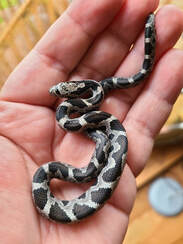
This baby Black Rat Snake was admitted after the misfortune of becoming stuck on a glue trap, highlighting the need for more humane measures to deal with rodents who may try to make their homes in human spaces, particularly as cooler weather sets in.
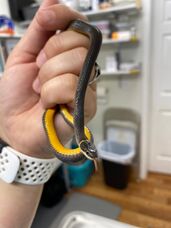
Here is another serpent saved from an untimely fate; a colorful Ringneck snake brought to Appalachian Wild after a cat attack. Despite his small stature, this little guy is completely full-grown!
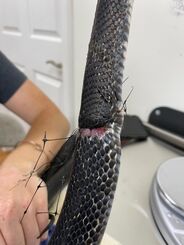
This large Black Rat Snake arrived at Appalachian Wild after becoming tangled in landscape netting. Landscape netting used to diminish erosion, and bird netting used in gardens, are notorious for snaring unsuspecting snakes, and you can help wildlife by finding safer alternatives. For erosion control on slopes, put down straw over native grass seed and skip the netting altogether. If you find netting, cut the holes before disposal to prevent wildlife from becoming entangled. In place of bird netting, plant an extra row for wildlife around the outer border of your garden to encourage hungry animals to feed on your surplus instead.
This large Black Rat Snake arrived at Appalachian Wild after becoming tangled in landscape netting. Landscape netting used to diminish erosion, and bird netting used in gardens, are notorious for snaring unsuspecting snakes, and you can help wildlife by finding safer alternatives. For erosion control on slopes, put down straw over native grass seed and skip the netting altogether. If you find netting, cut the holes before disposal to prevent wildlife from becoming entangled. In place of bird netting, plant an extra row for wildlife around the outer border of your garden to encourage hungry animals to feed on your surplus instead.
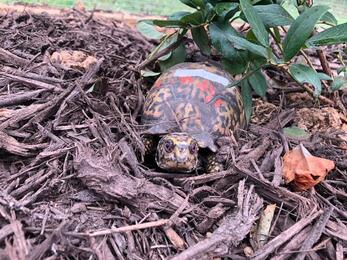
Last but not least, quite a few Box Turtles have also been set free in the past month! These shelled survivors were admitted primarily due to injuries caused by humans; often car strikes, getting hit by lawnmower blades or being snatched from the mouths of dogs who were making chew toys of the turtles’ tough shells. To help save turtles from trauma, watch out as you’re driving and carefully move turtles to the side of the road in the direction they were heading. Tall grass attracts wildlife, so keeping it cut short can make your lawn less desirable. Before mowing, walk the area first looking for turtles, and move them to the edge if you encounter them.
If you find orphaned or injured wildlife in need of help, contact the Emergency Wildlife Hotline at 828-633-6364 ext 1, or visit https://www.appalachianwild.org/found-an-animal.html
If you find orphaned or injured wildlife in need of help, contact the Emergency Wildlife Hotline at 828-633-6364 ext 1, or visit https://www.appalachianwild.org/found-an-animal.html
NUTS FOR NUTS? Help feed hungry squirrels!
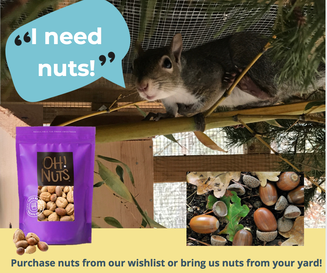
Join the crowd...or should we say “scurry.” Yep! That’s what a group of squirrels is called! They not only love nuts, but must have them to survive the winter. Squirrels think so much about nuts this time of year, researchers at the University of California-Davis theorize this may make their brains bigger! They believe squirrels build a mental map of their nut caches, and that process makes their brains grow larger.
We don’t need research to tell us that we are going to need a lot more nuts this fall for the more than 30 squirrels in our care. It’s “squirrels gone wild” ‘round here! These frisky ones will soon be moved to the outdoor pre-release enclosure, complete with leaf litter, climbing limbs, and nesting boxes -- a safe transition space perfect for them to finish growing while becoming acclimated to the outdoors. Here they will practice hunting for and hiding nuts scattered in the leaf litter. Since they will miss fall foraging season, nuts are needed to scatter on the grounds, enough to see them through winter. You can purchase whole nuts from the wishlist or harvest native ones from your yard. Nuts are available on our wishlist at AppalachianWild.org/wishlist. To arrange a pick up of harvested nuts, please email [email protected].
Have you taken a walk on the wild side yet?
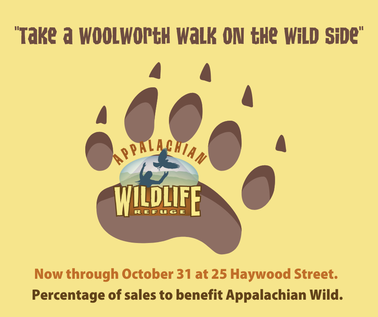
It’s a bit “wilder” at Woolworth Walk Gallery in downtown Asheville these days. On October 1st, its front window display became “inhabited” by our forest friends, as interpreted by 18 highly creative and talented local artists. These animal lovin’ artisans generously agreed to participate in the inaugural “Take a Woolworth Walk on the Wild Side” art show to benefit Appalachian Wild because they have a heart for wildlife rehabilitation and conservation. Each artist -- working in paint, fiber, clay, wood, wire, metal, glass, watercolors, etc. -- made us fall in love all over again with native wildlife.
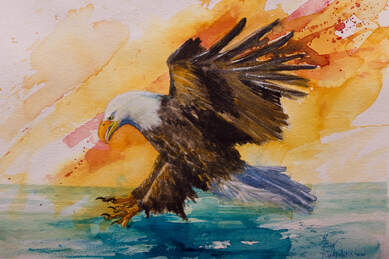
The show ends October 31st, so there's still plenty of time to treat yourself to this special show. Woolworth Walk is open Monday-Saturday 11-6 and Sunday 11-5, with social distancing enforced for safe shopping! Many of the works are in the front window display of Woolworth Walk, but more can be found inside by looking for the special paw print which indicates participating artists. If you purchase one of the designated artworks, a percentage of the sale goes to Appalachian Wild. Some artists are even donating the full sales price! There are works at every price point, which makes for great gift-giving! This is what we call a win/win/win situation. 1) You will own an amazing piece of artwork, 2) You are supporting local artists, and 3) You are directly helping injured and orphaned wildlife get a second chance at life! This is guilt-free shopping at its best so plan to shop today!
Out of the area? Call the gallery at (828) 254-9234 and order by phone to have items shipped!
Art by Gray Artus
Out of the area? Call the gallery at (828) 254-9234 and order by phone to have items shipped!
Art by Gray Artus
Art by Brian Mashburn Art by Angela Alexander
CORPORATE PARTNER SPOTLIGHT:
Animal Hospital of North Asheville
A very warm welcome to Appalachian Wild's newest corporate partner, Animal Hospital of North Asheville! During these difficult times, we depend on our partners more than ever. This past month, the Animal Hospital of North Asheville seemingly could not do enough to bring awareness to the needs of wildlife in our care, hosting a supply drive for the second year in a row. The initiative was spearheaded by Dot Williams, who was on a mission to ensure word got out by putting the supply drive on their website, arranging a podcast interview, posting on social media, and even blogging about it. She diligently followed up to see what else was needed and what more they could do. AHNA's efforts brought in more than $300 and contributed at least six new donors to the cause, on top of collecting much needed supplies for orphaned and injured wildlife!
Don't take our word for it! The dedicated team at AHNA had the following to share: "COVID-19 emerged and changed how we, as a community, can safely interact. It brought a feeling of uncertainty and isolation to many. COVID brought a chance for organizations to rethink how to operate and communicate. During this time, the use of technology increased. Through online technology, we were able to reach out to our amazing community to highlight the work Appalachian Wild does.
When we originally planned to do a second supply drive to support Appalachian Wildlife Refuge, the world looked a lot different than what it does now. We were excited to once again partner with AWR to increase awareness of how we, as families, individuals, and organizations, can help wildlife thrive, how through our actions we can prevent harm and create safe places for wildlife while supporting specially trained, compassionate individuals to help injured or orphaned wildlife in need.
Supporting supply drives is a way we can support and protect nature and wildlife in our corner of the world. During this time of limited interactions, it allows us to work as a community, form a connection, and be part of something selfless. As Gene Baur said: 'It is a small thing to help one animal but to that animal, it is a big thing.' That is what Appalachian Wild does every day, they make a difference to the wildlife they help. We want to say THANK YOU to everyone who donated through the supply drive to help Appalachian Wild!"
We couldn't have said it better ourselves! What an amazing partner the Animal Hospital of North Asheville has been in this important endeavor. A wild thank you to our newest corporate partner!
Don't take our word for it! The dedicated team at AHNA had the following to share: "COVID-19 emerged and changed how we, as a community, can safely interact. It brought a feeling of uncertainty and isolation to many. COVID brought a chance for organizations to rethink how to operate and communicate. During this time, the use of technology increased. Through online technology, we were able to reach out to our amazing community to highlight the work Appalachian Wild does.
When we originally planned to do a second supply drive to support Appalachian Wildlife Refuge, the world looked a lot different than what it does now. We were excited to once again partner with AWR to increase awareness of how we, as families, individuals, and organizations, can help wildlife thrive, how through our actions we can prevent harm and create safe places for wildlife while supporting specially trained, compassionate individuals to help injured or orphaned wildlife in need.
Supporting supply drives is a way we can support and protect nature and wildlife in our corner of the world. During this time of limited interactions, it allows us to work as a community, form a connection, and be part of something selfless. As Gene Baur said: 'It is a small thing to help one animal but to that animal, it is a big thing.' That is what Appalachian Wild does every day, they make a difference to the wildlife they help. We want to say THANK YOU to everyone who donated through the supply drive to help Appalachian Wild!"
We couldn't have said it better ourselves! What an amazing partner the Animal Hospital of North Asheville has been in this important endeavor. A wild thank you to our newest corporate partner!
| Folks willing to do supply drives to solicit items from our wishlist of food, medicines, supplies, and sundries mean the world to us! If you are interested in hosting a supply drive, please email Kerri at [email protected] for more information. It can be as simple as putting a box on your front porch and inviting neighbors to toss in some paper towels or laundry detergent the next time they pass by from the store, hosting a drive at your local business, or even sharing and promoting our wishlist online! |
VOLUNTEER SPOTLIGHT:
Laura Pease
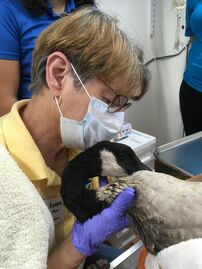
Laura Pease was one of the first volunteers when the Appalachian Wildlife Refuge (AWR) Center opened a little more than two years ago. Today, she is a regular at the center who finds that volunteering is good for her spirits in challenging times.
“Working with the animals is very rewarding,” Pease says. “It keeps my mind sharp and I’ve been astounded at how much I’ve learned working with animals at the wildlife center--you learn how to read them, how to approach them and the importance of each creature.”
Pease has always had a passion for animals. Growing up in Louisiana, she dreamt about becoming a veterinarian but ended up working in social services. After retiring and relocating to Western North Carolina, she found AWR as a way to help wildlife and stay engaged with nature.
“I am a happy camper working with animals,” she says. “It’s good for a rest from the outside world.”
“Working with the animals is very rewarding,” Pease says. “It keeps my mind sharp and I’ve been astounded at how much I’ve learned working with animals at the wildlife center--you learn how to read them, how to approach them and the importance of each creature.”
Pease has always had a passion for animals. Growing up in Louisiana, she dreamt about becoming a veterinarian but ended up working in social services. After retiring and relocating to Western North Carolina, she found AWR as a way to help wildlife and stay engaged with nature.
“I am a happy camper working with animals,” she says. “It’s good for a rest from the outside world.”
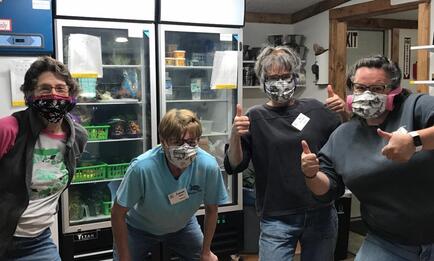
Like all AWR volunteers, Pease went through training to learn animal care protocols which emphasize that wild animals are not pets to play with or cuddle. But, sometimes she can’t help getting attached. Pease is especially fond of a blind box turtle called Helen - named after Helen Keller, of course. (While AWR discourages naming animals who will be returned to the wild, an exception was made for Helen who, due to her disability, will likely spend the rest of her days at the AWR facility.)
Pease especially enjoyed spending time spoon-feeding the animal “turtle meatballs,” a favorite treat for the shelled critters, and she was always careful to make sure the sightless creature got enough to eat.
“After a year she began to eat by herself,” Pease said. “And, I would say ‘yes, Helen, you can do this.’ It was wonderful to see her improve."
If you are interested in volunteering with Appalachian Wild, learn more here!
Pease especially enjoyed spending time spoon-feeding the animal “turtle meatballs,” a favorite treat for the shelled critters, and she was always careful to make sure the sightless creature got enough to eat.
“After a year she began to eat by herself,” Pease said. “And, I would say ‘yes, Helen, you can do this.’ It was wonderful to see her improve."
If you are interested in volunteering with Appalachian Wild, learn more here!
Our Caring Community
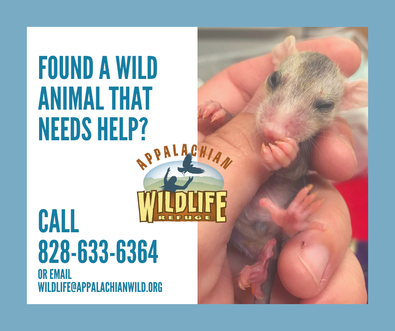
It may interest you to know our Emergency Wildlife Hotline volunteers have fielded nearly 4,000 calls since the beginning of the year! That means FOUR THOUSAND people care enough about the injured or orphaned wildlife they happen upon to want to do something about it. How great is that?!
Take Connie Toops, for example. She has used the wildlife emergency hotline (828-633-6364) numerous times. “I would estimate that I have brought in a dozen or more turtles in for care, including two that my husband accidentally injured while bush hogging the fields,” says Connie, a former National Park Service naturalist and retired nature writer and photographer. “My husband is a former biologist with the National Park Service, so he is careful to check the fields before he works. Somehow, he ended up clipping two of them and we called the hotline immediately.” Both had serious injuries but recovered, although one was non-releasable and will remain in Appalachian Wild's care until placed in a wildlife education program.
Take Connie Toops, for example. She has used the wildlife emergency hotline (828-633-6364) numerous times. “I would estimate that I have brought in a dozen or more turtles in for care, including two that my husband accidentally injured while bush hogging the fields,” says Connie, a former National Park Service naturalist and retired nature writer and photographer. “My husband is a former biologist with the National Park Service, so he is careful to check the fields before he works. Somehow, he ended up clipping two of them and we called the hotline immediately.” Both had serious injuries but recovered, although one was non-releasable and will remain in Appalachian Wild's care until placed in a wildlife education program.
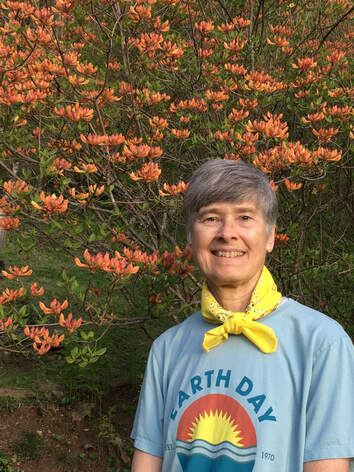
When asked about her experience with the hotline, Connie remarked, “It is clear Appalachian Wild is dedicated to the best interests of wildlife. I am asked diagnostic questions and always feel assured that what needed to happen was being done in the most efficient way.” Whenever she rescues a turtle, she takes a picture of the location so the turtle can be returned to that exact spot. Turtles have a home territory so this is important. “They have incredible memories and incredible senses of where they are,” explains Connie.
This summer, Connie got several turtles suffering from respiratory problems in to our care. After treatment and convalescence, they were returned as a group, fully recovered and ready to resume their intended life in the wild. “I released them by our pond, which has a little outflow,” explained Connie. “They just hung out there, alternately soaking up the sun and burying themselves in the mud, and noshing on blackberries for 7-10 days. I kidded Nancy (the hotline lead) -- given this behavior-- that the facility must actually be a spa!”
Connie echoes the sentiments of many of the finders: “It is a sad feeling to find a sick animal that needs help, but it is a good feeling to send it off to Appalachian Wild knowing it will get such great care.” A wildly wonderful thank you to Connie and all the members our our community helping bring orphaned and injured wildlife to safety!
This summer, Connie got several turtles suffering from respiratory problems in to our care. After treatment and convalescence, they were returned as a group, fully recovered and ready to resume their intended life in the wild. “I released them by our pond, which has a little outflow,” explained Connie. “They just hung out there, alternately soaking up the sun and burying themselves in the mud, and noshing on blackberries for 7-10 days. I kidded Nancy (the hotline lead) -- given this behavior-- that the facility must actually be a spa!”
Connie echoes the sentiments of many of the finders: “It is a sad feeling to find a sick animal that needs help, but it is a good feeling to send it off to Appalachian Wild knowing it will get such great care.” A wildly wonderful thank you to Connie and all the members our our community helping bring orphaned and injured wildlife to safety!
Nature News
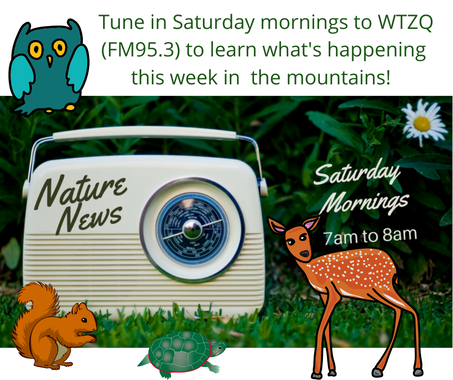
Every Saturday on WTZQ at 7 AM you can listen to “Nature News” with Carlton Burke and Dan Lazar.
Naturalist, educator, and Appalachian Wild Board Member Carlton Burke operates an educational service called “Carolina Mountain Naturalists,” which specializes in presenting live animal and nature programs and displays for area schools, summer camps, and many other organizations. With his vast experience as a state and federally licensed wildlife rehabilitator, Carlton is worth tuning in to. Check out this local, hour-long radio program featuring news from the natural world around the western NC region. Listen when you can! The last five podcasts are online at www.wtzq.com/show/nature-news/
You Can Now Follow Them On Facebook!
www.facebook.com/Nature-News-Radio-Program-239876519775255/
Naturalist, educator, and Appalachian Wild Board Member Carlton Burke operates an educational service called “Carolina Mountain Naturalists,” which specializes in presenting live animal and nature programs and displays for area schools, summer camps, and many other organizations. With his vast experience as a state and federally licensed wildlife rehabilitator, Carlton is worth tuning in to. Check out this local, hour-long radio program featuring news from the natural world around the western NC region. Listen when you can! The last five podcasts are online at www.wtzq.com/show/nature-news/
You Can Now Follow Them On Facebook!
www.facebook.com/Nature-News-Radio-Program-239876519775255/
Rake for a cause!
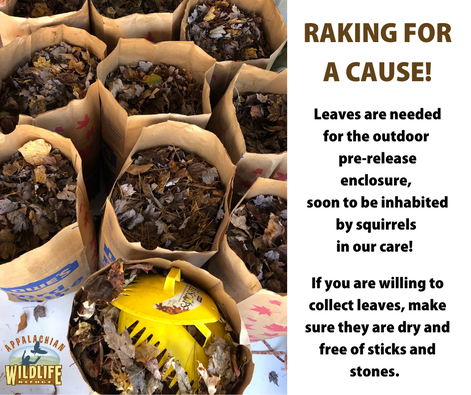
It's that time of year again, with the mountains ablaze with color and dead leaves falling everywhere we look. Dead leaves are needed for the squirrels in our care. They will be moving into an outdoor pre-release enclosure which is meant to closely mimic the natural world. The squirrels need leaves to build their nests (drays) and to hunt for nuts among the leaf-littered floor. If you are willing to rake up and bag leaves for this purpose, email [email protected]. Please make sure they are dry and free of debris like sticks and stones. The wild ones thank you!
It's that time of year again, with the mountains ablaze with color and dead leaves falling everywhere we look. Dead leaves are needed for the squirrels in our care. They will be moving into an outdoor pre-release enclosure which is meant to closely mimic the natural world. The squirrels need leaves to build their nests (drays) and to hunt for nuts among the leaf-littered floor. If you are willing to rake up and bag leaves for this purpose, email [email protected]. Please make sure they are dry and free of debris like sticks and stones. The wild ones thank you!
| Want to share all this wildly good news? The following link will show this issue of Appalachian Wild Tracks in your browser, and you can use it to share it in your own newsletter, via email, or on social media! https://conta.cc/3j6CLkp Spread the good news! |
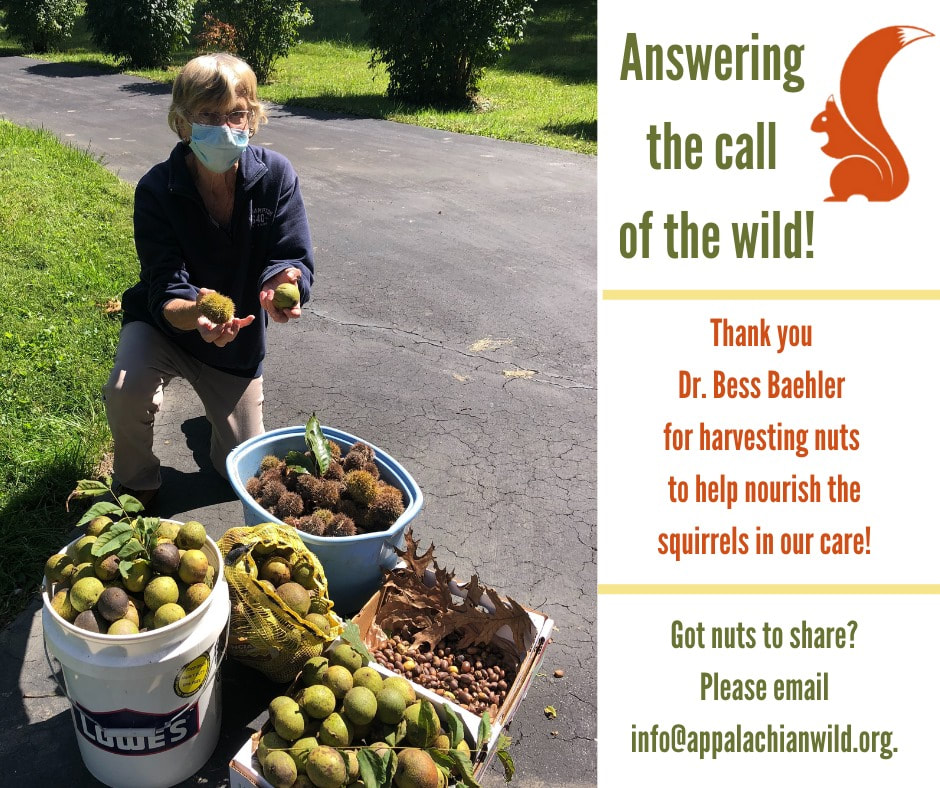
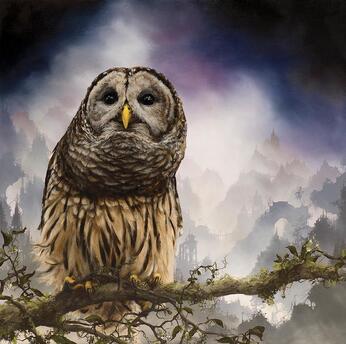
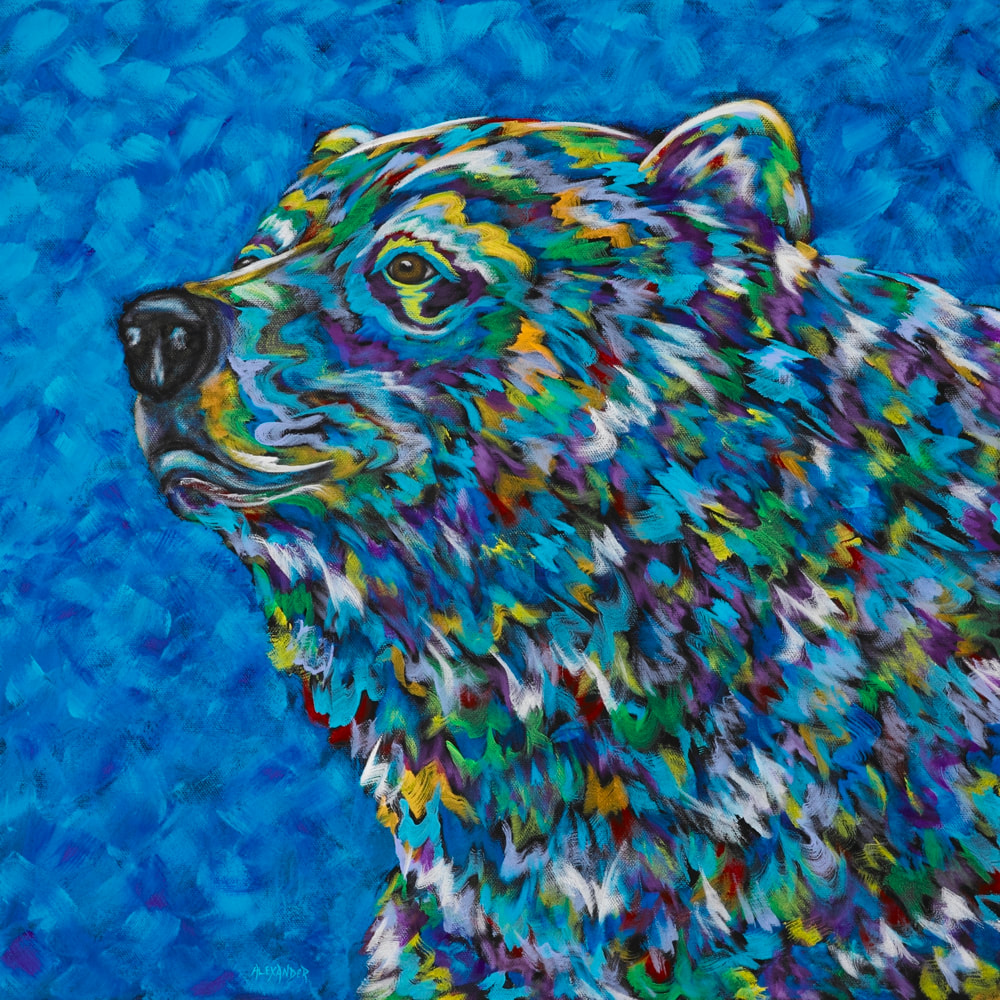
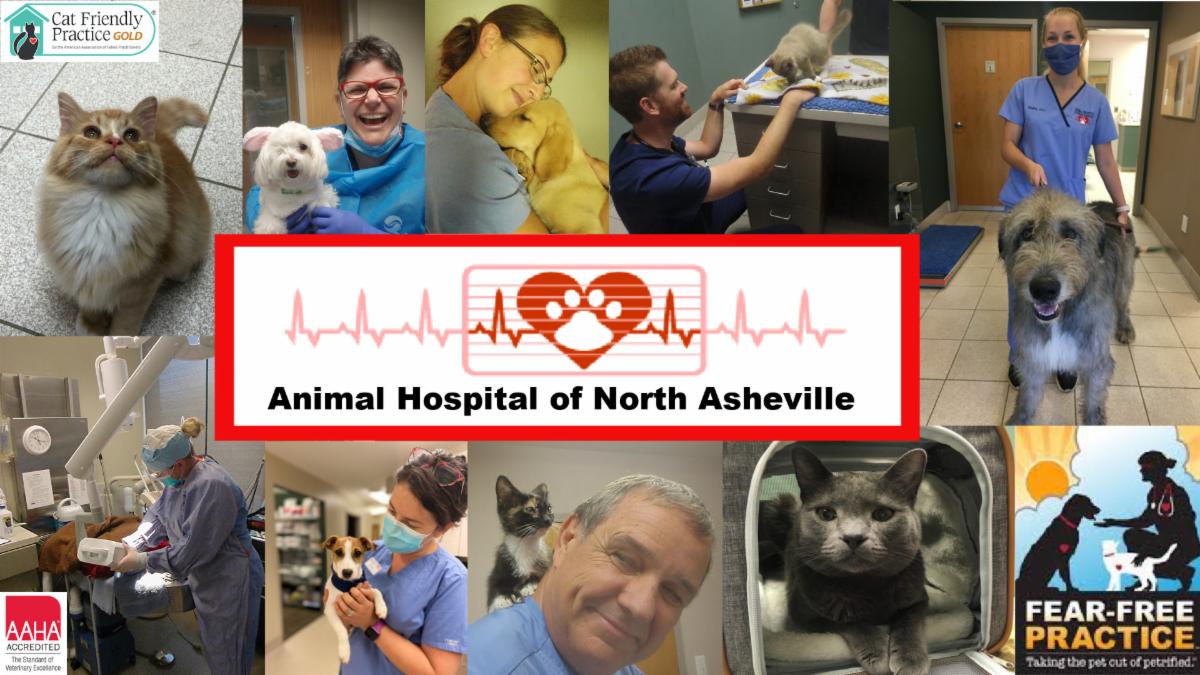
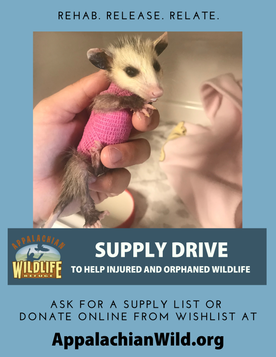
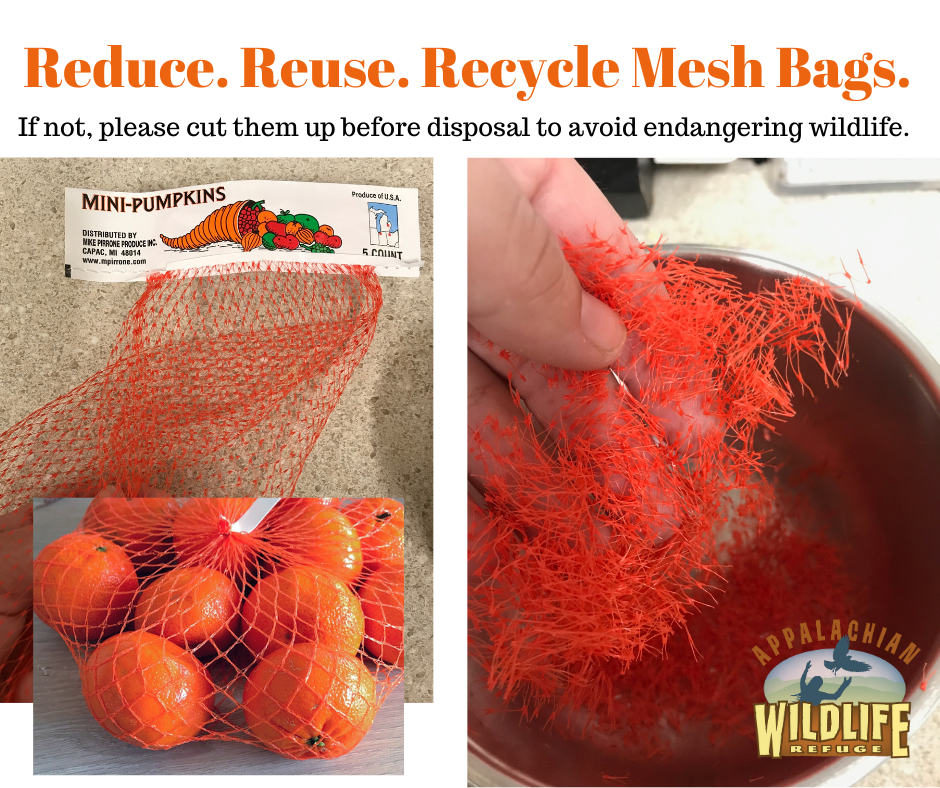
 RSS Feed
RSS Feed